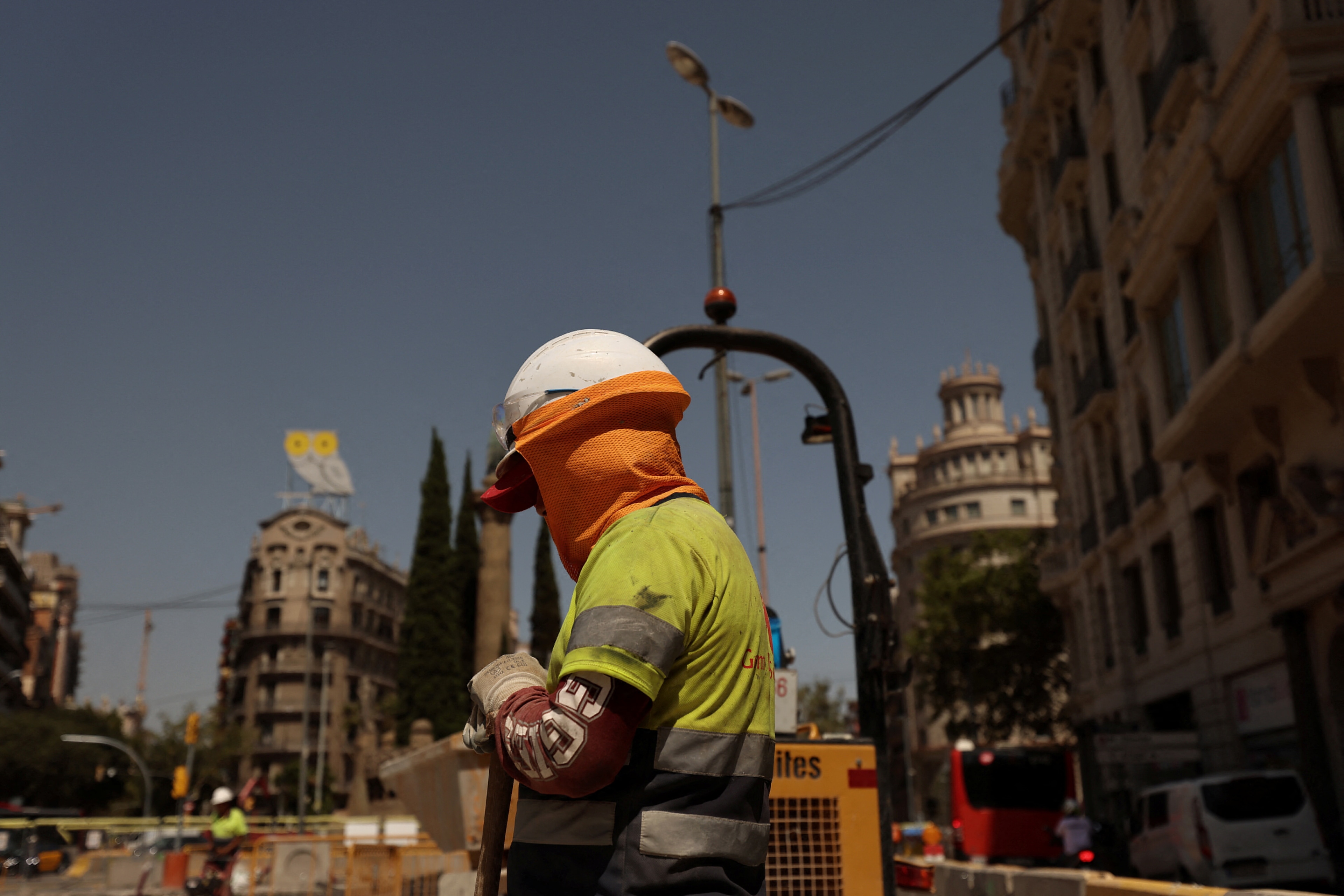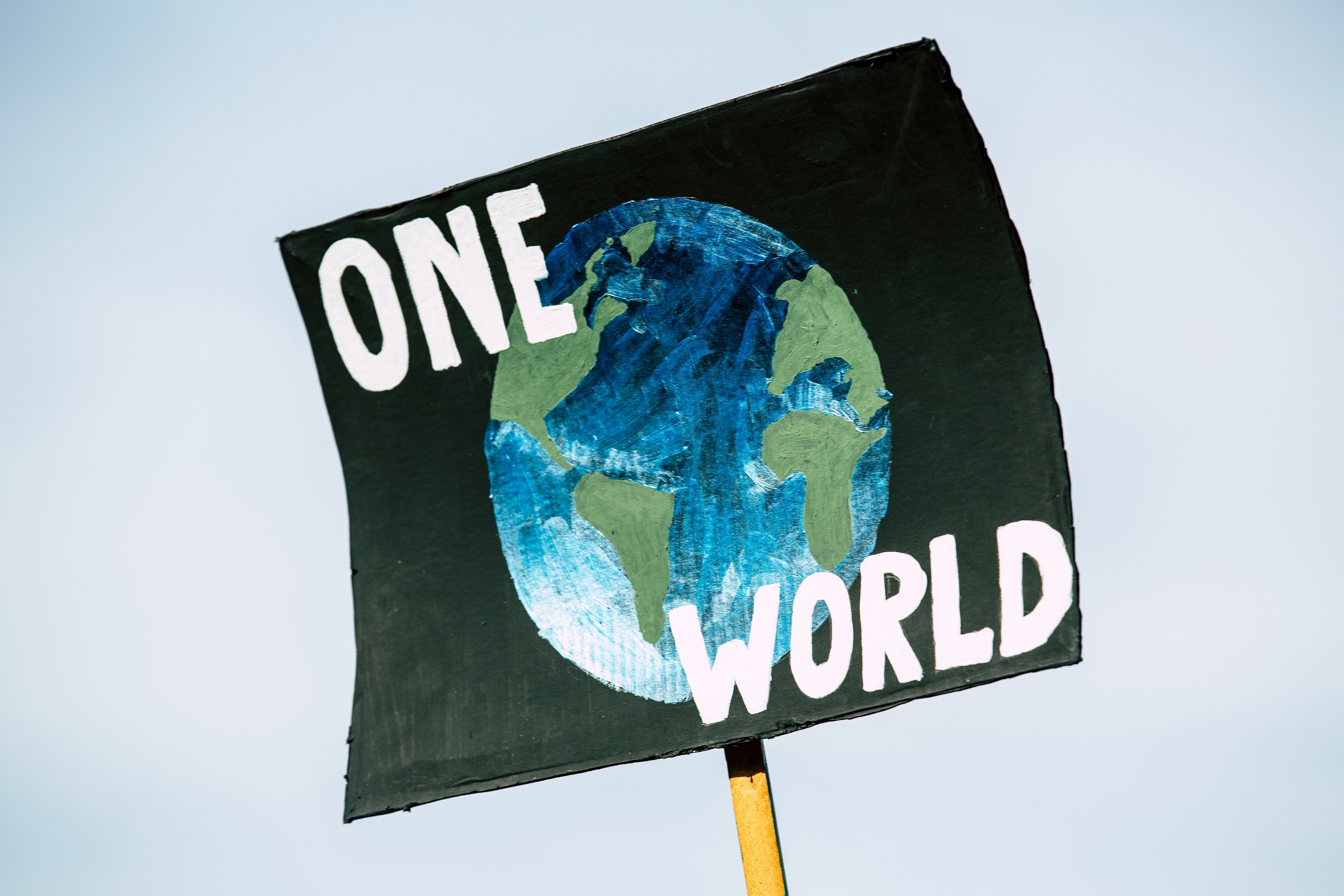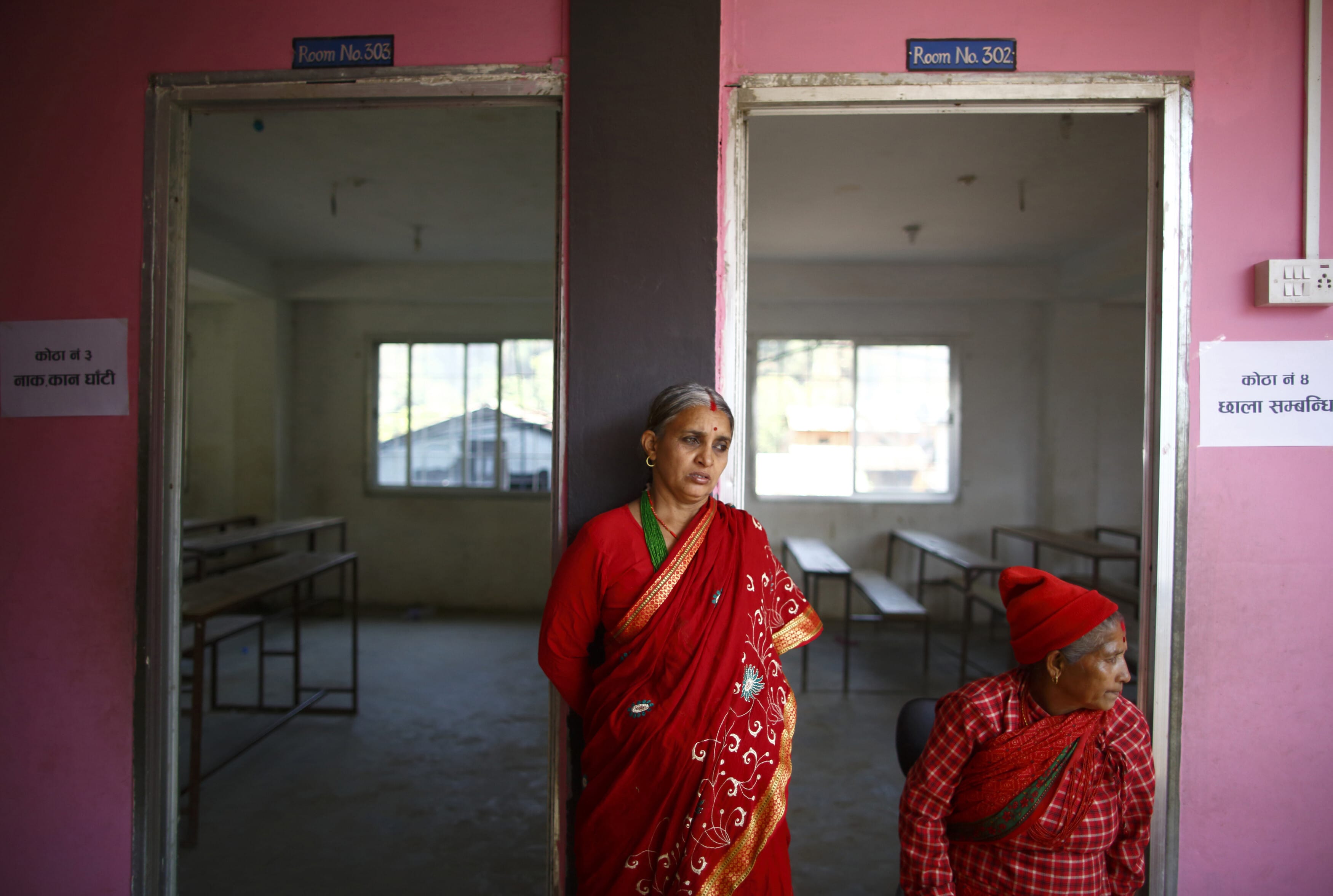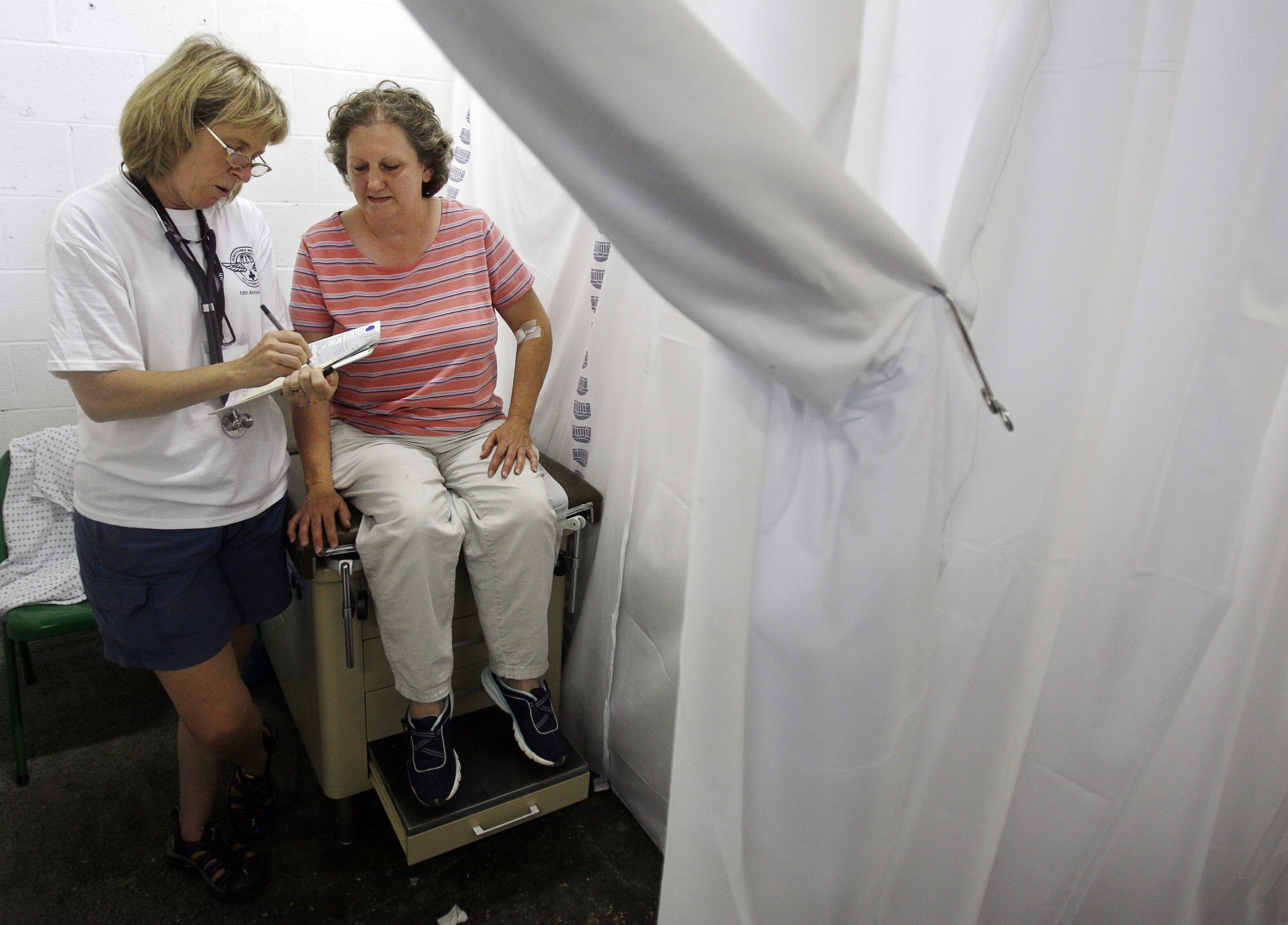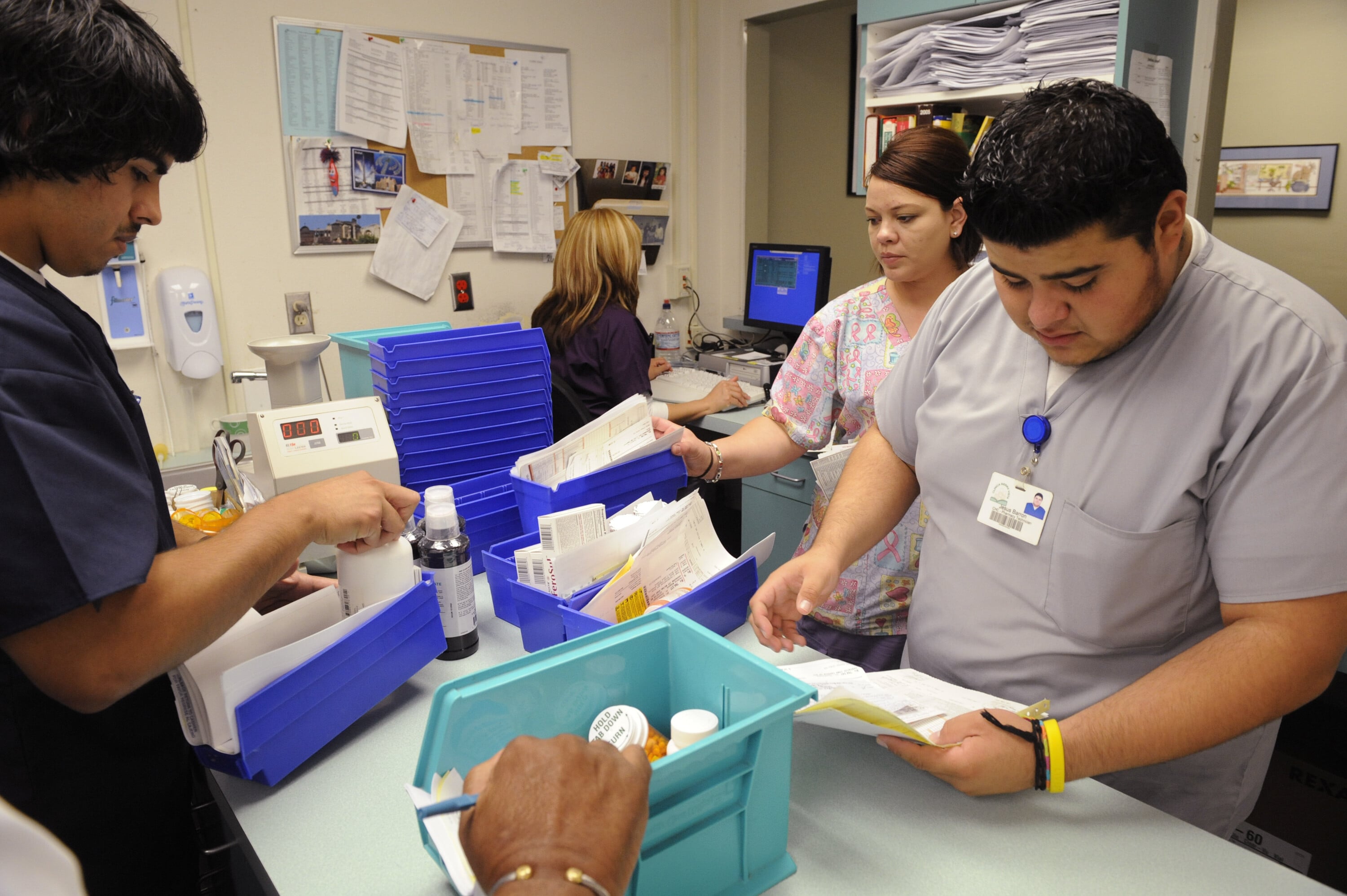COVID and cancer: how the pandemic created another health time bomb - this week's Radio Davos podcast

The battle against COVID has delayed cancer care for millions of people.
Image: National Cancer Institute on Unsplash
Stay up to date:
Global Health
Accept our marketing cookies to access this content.
These cookies are currently disabled in your browser.
- For two years the pandemic delayed cancer diagnosis and treatment.
- That means a big backlog, and more serious outcomes for some patients.
- Experts tell Radio Davos what needs to be done, and what the pandemic has taught us.
- Subscribe the the podcast here.
COVID paralysed healthcare systems around the world. And while some ‘elective surgeries’ - ones that are not immediate emergency procedures - can wait, when it comes to cancer, early diagnoisis and treatment are vital.
In this episode of the Radio Davos podcast, we hear from a cancer surgeon working on the frontline against the disease in India, and get the latest from the head of the cancer business unit of a major pharmaceutical company.
And as the White House announced a new push on President Joe Biden's longstanding 'moonshot' ambition to wipe out cancer, we hear from him and Vice-President Kamala Harris,whose mother was a cancer researcher but herself died of the disease.
Biden speaking about his 'Cancer Moonshot' in Davos in 2017:
Accept our marketing cookies to access this content.
These cookies are currently disabled in your browser.
And at this week's press conference:
Joe Biden: Our message today is this: We can do this. I promise you. We can do this. For all those we lost, for all those we miss, we can end cancer as we know it. I committed to this fight when I was vice president. It's one of the reasons why, quite frankly, I ran for president. Let there be no doubt, now that I am president, this is a presidential White House priority.
I'm proud to announce our plan to supercharge the 'Cancer Moonshot' as a central effort of the Biden-Harris administration. It's bold. It's ambitious. But it's completely do-able. Just as we harness the science to develop the cutting edge COVID-19 vaccines and treatments, we'll bring a fierce sense of urgency to the fight against cancer. The goal is to cut the cancer death rate in half in the next 25 years - at least by 50%.
Kamala Harris: You see, after a lifetime working to end cancer, cancer ended my mother's life. I will never forget the day that she sat my sister and me down and told us she had been diagnosed with colon cancer. It was one of the worst days of my life. And an experience that, sadly, millions and millions of people in our country have had. My mother was a fighter. All five feet of her. You would've thought she was seven feet, but she was only five. And as I cared for her during those many months, I watched her courageous fight. But after countless rounds of chemo, her body gave out. She was transferred from the hospital to hospice, and, in fact, one of the last questions she asked the hospice nurse, was 'are my daughters going to be okay?' I miss my mother every day, and I carry her memory with me wherever I go."
COVID and cancer: AstraZeneca's oncology chief
AstraZeneca, well known for its COVID vaccine, is also heavily involved in cancer care. David Fredrickson, Executive Vice-President of its Oncology Business Unit, wrote a blog for the WEF’s website Agenda called Cancer: how to stop the next global health crisis. Below you can read the transcript of the podcast interview.
Have you read?
David Fredrickson: One of the things that we certainly know and all of us have experienced it is that COVID 19 has been disruptive to our world and lifestyles in so many ways. Unfortunately, the impact that it has had on cancer has been really dramatic. And it's as simple as the following, which is that cancer is best treated if we're able to catch it early, diagnose it early, and ensure that the best treatments get to patients. And we're seeing delays in screening, delays in testing, delays in diagnosis, and that is really creating a second problem that is a healthcare crisis on the heels of what we already know has been a huge problem with the pandemic. And just to put a couple of numbers around this so that it's not just qualitative: the European Cancer Organisation predicts that because of COVID-19, there have been 100 million missed cancer screenings across Europe and a million missed diagnoses. The American Cancer Society Cancer Action Network reported that more than three-quarters of people actively undergoing treatment for cancer had to delay some aspect of their care as a result of COVID-19. And we know the earlier we catch cancer the better. We know that even a four-week delay in beginning treatment can be associated with increased mortality. So the facts really do point to the importance of us having vigilance around this.
Robin Pomeroy: Yeah, because it's been kind of anecdotal, hasn't it? So, for two years hospitals all over the world have been overrun by COVID-19, and people have been told to stay away, there have been lockdowns, and there were always right from the start concerns raised that how will this affect people with ongoing medical problems. But now we're starting - two years now on from that - we're starting to see actual figures and you've put some figures to it. What can be done then? So we're two years in now. I guess we're all hoping that COVID might be in retreat at some point. You know, we had Dr. Fauci on Radio Davos just last week saying that perhaps Omicron could signal that we're in the end game, but there are lots and lots of caveats. But what do you see in terms of cancer treatment and in terms of cancer detection? What needs to be done?
David Fredrickson: So I think that the first critical step is ensuring that there is high awareness around this fact that we need to have a return to routine visits, especially for those people who are at risk for, potentially, a cancer diagnosis. We have been a part, at AstraZeneca, of an effort to develop a campaign called 'New Normal, Same Cancer'. That campaign's whole objective has been outreach to the public about the importance of resuming their routine visits to their primary care physicians and for them really making sure that they don't wait to go in and get their regular check-ups. It's been a programme that we've launched in partnership across the globe - it's in over 40 countries - and we have really found that message has been a really important one. Again, anecdotal, but we've received emails from New Zealand of a woman who said as a result of this, "I went and had my check-up. And the bad news is, is that I was diagnosed with non-Hodgkin's lymphoma. But the good news is that I wouldn't have gone to actually have that check-up if it weren't for the campaign." So I do think that's the first piece. I think the second piece and perhaps this is the place for optimism, Robin, within the pandemic, is I do think that there is a receptivity to working together between private and public sector to be able to tackle some of the most significant healthcare challenges that we face. I think that COVID showed us that if we work together, between global organizations, and local, and also between private and public, that we can move the needle on really difficult issues. And I think that's perhaps the silver lining of what we've seen as possible through the last couple of years.
Robin Pomeroy: Are there ways in which the pandemic has resulted in improvements to cancer care?
David Fredrickson: Indeed, there are some places where I think a push towards healthcare system sustainability and also a need to be able to ask patients to not come into hospital and the clinic, has proven to be a source of innovation. So we have, for example, been able to eliminate visits and follow-up that may have taken place for more administrative reasons and clinical trials, but that we ultimately decided aren't adding that much value. Why would we ask a patient to come in for this follow up? It's burdensome to them, it creates a bad experience and we're not getting that much out of it. So I think that there's been a lot of work to streamline the patient experience and to be able to do more remotely within the trial context.
I also think that we've seen some really important work being done by health authorities to streamline their regulatory processes. So without actually having an adverse impact on the safety of medicines, looking at ways for, you know, if more convenient dosing schedules are available that, for example, we have one of our medicines that we move from a three-week dosing schedule to a four-week dosing schedule, just because that means fewer hospital visits. Perhaps before COVID, the process for getting that approved might have taken several months, and as a result of COVID, we found that we're able to do it in several weeks, and this shows that partnership between health authorities and companies to streamline this in service of patients. I think we've also looked for more ways to bring trials to patients like I mentioned, through digital tools and other mechanisms. I think that also we see a lot more telehealth and digital health, and I think that these, again, are important evolutions that will be sources of innovation that will be persistent going forward.
We're making great progress in science and technology and data that is allowing us to be able to bring the promise of cure, but we've got to diagnose it early enough in order to be able to do that.
”Robin Pomeroy: We're talking a lot about work being hybrid now. You know, it's kind of been a revolution in the workplace. People aren't all going to go back to the office or the workplace. There's going to be hybrid working. So what you're suggesting is when it comes to medicine as well, they'll be the good elements of not going in-person to see your physician. Perhaps some of that will stay if we can do it the right way.
David Fredrickson: I absolutely think so. And of course, with something like cancer, there's always going to be a need for in-person visits for certain tests and procedures and labs that are going to need to take place. But I do think that we're seeing quite a lot more that's evolving, that's less invasive, that's easier to administer. And I think that all of this improves the patient experience quite dramatically. I think that's every bit as important, as we think about what we're trying to do for patients - the outcomes that they have meaning how much are we actually really improving their medical outcomes, but also the experience and the quality of life that they have and all of these factors are impacted by it, frankly, staying out of hospitals as much as possible.
Robin Pomeroy: Now, another element you touched on in your blog was about screening and new ways of screening for lung cancer. Are you able to tell us something about that?
David Fredrickson: Yeah, absolutely. We've been working with four leading organizations on an effort called the Lung Ambition Alliance. The Lung Ambition Alliance is really aiming to do three things. First, to increase screening and early diagnosis. Second, to help the delivery of innovative medicines across the globe. And lastly, to improve quality of care. And it's really on this first piece - on screening - where we've put the most effort. And that's because, unfortunately, screening rates are abysmal across the globe on lung cancer.
Robin Pomeroy: It's not a type of cancer that you think people get screened for. There is a handful of cancers where in certain countries, in certain parts of the world, there are screening procedures in, but lung cancer. I'm not aware of that.
David Fredrickson: Yeah. And in part, it's because lung cancer screening is today defined most well for smokers or former smokers. And so I think that there's a lot of work that needs to be done to better define risk factors and lung cancer for non-smokers, because that's also very significant for a population who for other reasons than smoking, do develop lung cancer. We've been working very diligently because lung cancer is the leading cause of cancer death, to take action on how do we really make sure that we're driving early screening initiatives across the globe and really working hard for people to understand the cost of inaction as it relates to outcomes and survival? Because we know that the earlier that we treat, the better the outcomes and we're making great progress, Robin, in terms of science and technology and data that is allowing us to be able to, I think, really bring the promise of, hopefully, cure, but we've got to diagnose it early enough in order to be able to do that.
Robin Pomeroy: Yeah, you put some numbers in your blog here: lung cancer kills 1.8 million people every year, costs (obviously the emotional cost), but also the economic cost €19 billion each year on lung cancer in Europe alone. Yet only around one in five patients with lung cancer are diagnosed at stage one, diagnosed at that early stage, where treatment is going to be most likely to have the desired effect. And then you go on to talk about low-dose CT scans, which is, I guess, the new technology that you're talking about. How would that work in practise?
David Fredrickson: Low-dose CT scan is actually a technology that we've had for quite a long time. It's not the most innovative new technology that we have, but it is indeed quite effective. Part of the challenge is, of course, you know, how do we make sure that we get patients that are at risk to be identified and then go through low-dose CT scanning. I think one of the places that the most progress has been made on this is indeed within the UK. I think that throughout Europe we're beginning to make progress by working locally on mobile units that are mobile low-dose CT scanning units and where there's an opportunity for people to be able to understand if their risk factors make it such that they should be getting low-dose CT scanning and trying to do it right there in a mobile unit so that there can be the opportunity to make that screening happen at that time.
Another mechanism, Robin, that we're really pushing forward is that lung cancer oftentimes is diagnosed as a result of something else that happens. So somebody will have, you know, a car accident, and they'll get a scan, and in that scan, they'll see what's called a nodule. And it's that incidental nodule - it needs to be worked up to understand if it could be cancerous. And so incidental nodule clinics and protocols and procedures around that is another important way, along with low-dose CT scanning, that we're really working on, on trying to make sure that those are getting well-established.
I'm hopeful that over the course of the next several years we will see relatively low-invasive blood-based screening technologies begin to become part of the norm that are not just effective at being able to screen for lung cancer, but multi-cancer screening that through a simple blood test – and this is not science fiction.
”And then for the future, there's been really exciting advancements in blood-based screening. And I'm hopeful that over the course of the next several years that we will see relatively low invasive blood based screening technologies begin to become part of the norm that are not just effective at being able to screen for lung cancer, but multi-cancer screening that through a simple blood test – and this is not science fiction – I mean there are companies that are doing this today that will begin to be able to diagnose at early stages cancers before they become advanced and difficult to treat.
Robin Pomeroy: Talking of science fiction that's actually science fact, artificial intelligence has been talked about a lot in the last few years as being great at detecting cancers. Is that going to be an important thing?
David Fredrickson: It is something that will be important and, in fact, artificial intelligence, if you just take a look at the entire research and development process for oncology, is going to play a really important role. Specifically on your question, one place where AI is already beginning to make a difference is in reading pathology scans and really working to try to detect and see can we pick up, perhaps through AI early cancers that the normal eye doesn't see? And so that's something that we certainly are already seeing progress on. Also, outside of the screening realm, using artificial intelligence to be able to better take a look at a patient's genomic profile together with their actual clinical history to be able to determine what are the best treatments that we could be utilising based on comparing a patient's profile to all of the other database of information that we have on patients that look like the patient that's in front of us to be able to really better tailor and make more precise the approaches in the treatments that we're going to make for patients. So certainly, big data, artificial intelligence are revolutionising the way in which we do drug discovery, drug development and the delivery of medicines to patients.
Accept our marketing cookies to access this content.
These cookies are currently disabled in your browser.
Robin Pomeroy: We started this conversation talking about the impact of COVID-19 on cancer, and you talked about this getting back to a new normal with the same disease. When do you think we'll be back to a new normal? Might be impossible to say because it would depend on the city and the state and the country. People who are involved in treating cancer and people who have cancer - when will the whole COVID effect just not really be anything they take into account anymore? Are we talking about six months, a year, several years? There's going to be this kind of hangover effect from COVID-19?
We've got to make sure that we're approaching cancer with an assumption that the world never goes back to what it looked like pre-COVID.
”David Fredrickson: It really is a critical question, Robin. I don't have the crystal ball to know exactly when the 'new normal', as you say, will commence. What I do know is that we remain today with cancer diagnoses and cancer treatment rates below pre-COVID baseline levels - probably about 10-20% below pre-COVID baseline levels, depending upon region and the globe and what tumour type we're talking about. But it's pretty consistent across the board. I'm pretty concerned that that will remain this way, especially with Omicron and the influx that we simply saw in the number of cases and hospitalisations that came with that. But I do also at the same time believe that the health systems are evolving in order to be able to have to now work in a more endemic-like environment within this. And we've been working now for two years on making sure that the collateral damage to cancer care is something that we create a lot of awareness around. That's why I'm grateful that we have the focus here as part of this podcast on the importance of this. And I think that the imperative is that for all of us, the new normal needs to begin now because I think that we need to just accept that probably waves of this as part of our future, this being of some version of variants, and so I think that we've got to make sure that we're approaching cancer with an assumption that the world never goes back to what it looked like pre-COVID.
COVID and cancer in India
To get a view from the front line of the fight against cancer, I spoke to the head of surgical oncology at Lilavati Hospital in Mumbai, Jagannath Palepu. I asked Dr Jagannath, or Dr J as he likes to be known, what was his experience during the last two years.
Dr. Jagannath: The plight of the non-COVID patients has not been highlighted, and let me tell you that cancer patients, particularly, faced many hardships and hurdles in the last two years. The first wave was in March 2020 approximately. This I would call a wave of lockdowns - the government simply closed down everything and the hospitals were asked to earmark 80% of beds [for COVID]. This was a time when we had little information, lots of sick patients. So all elective surgeries were kind of put on the background and we had to tell the patients to wait. And they come back to us saying 'how long?' And we kept postponing and there were delays, there's no doubt about it.
Robin Pomeroy: How serious were the consequences of those delays? We all know that cancer, it needs early detection and early treatment. Did you see some cases where things went terribly wrong because of those delays?
Dr. Jagannath: Most certainly. One patient whom I cannot really forget, also happens to be my friend and an accountant, whom I operated upon for a sarcoma of the thigh. Three years ago he was very particular on his follow ups - regular chest x-rays and CT scans, every four months - but when the COVID pandemic started the hospitals shut down, the clinics, and he really had no place where he could get a good scan done. This went on for a year and by the time the next year came in and we had a scan done he had a metastatic lesion on the lung and that had also increased and we could not even operate on him and he had to undergo chemotherapy and radiation. I feel particularly bad because here is an educated patient with access to care but simply could not just do a regular follow-up. There were plenty of cases where elective surgery had to be deferred because ICUs were full, the beds were not available and the transportation was extremely difficult.
Believe me, operating with a PPE suit and at times for four to six hours on a complex cancer surgery, that was a task.
”Robin Pomeroy: Was there a period during which there was no cancer work going on at all. Or did you manage to keep something going?
Dr. Jagannath: We did manage to keep some of it going, because cancer, as you know, can be classified as a semi-emergency. So we did keep it going. But some of those tumours which have very slow growth, no symptoms - those we had to just wait for some time. We were also worried about the patients getting infected in the hospitals, so that was another worry. We kept telling patients to be a little careful. Believe me operating with a PPE suit and at times for four to six hours on a complex cancer surgery, that was a task.
I think the worst hit, I would say, were the chemotherapy patients. They had to come repeatedly for cycles of chemotherapy and every time they had to do PCR - the tests were difficult in the earlier period, so they had a tough time. And many of them had to be shifted on[to] oral therapy. So I think their double risk of getting exposed to COVID every time they had to come, many of them dropped out of therapy just because they could not handle it anymore.
Robin Pomeroy: So what's the situation like now? Presumably, the lockdown has gone, but you must have a backlog, I'm assuming, of these elective surgeries that you weren't able to do over that period. What's it like now?
Dr. Jagannath: In the last year what has happened was we did have a window - every single day we operated and tried to clear as much of the backlog as possible. That was when the team worked day and night to clear all the major surgeries, and we did substantial output. And just when we were thinking that we are now kind of on a roll then the second wave of Delta hit us. That brought on a lot of morbidity and mortality and, again, there were setbacks because once again the ICUs were full with very sick patients. There was a lot of shortage of supplies, and the cancer patients took a back seat. I think cancer, dialysis patients, some patents with angina, they were very badly hit in the second wave. Current wave is Omicron and Delta. As I talk to you I'm on the third day of quarantine. I would say that three-fourths of my resident staff were all in quarantine at one time – half the nurses were in quarantine. This wave, Omicron, has hit the healthcare workers most, my residents particularly working for last two years without a break, would not even go home, were just about looking for a little holiday in December when Omicron hit and most of them went into quarantine, so we didn't have a workforce. Residents are coming back after five days, six days, and they're flying back into the wards, and I must admire, as if nothing has happened to them. All of us, and, I'm sure, all of you, will be looking for this one single question: when is it going to end.
For cancer care, technology is the key. If we use these emerging technologies – telemedicine, remote diagnosis and remote treatment – this is the way to go.
”Robin Pomeroy: Can I just ask you, you mentioned earlier on your patient who's also your friend, the accountant, and you said the cancer spread from his leg to his lungs. How is he now?
Dr. Jagannath: He is through his chemotherapy and unfortunately we could not offer him surgery so he ended up having radiation. He's OK, he's weak because of therapy, he had challenges but you know, in a sarcoma, surgery is always the first and the best option. I feel terrible that potentially the operable lesion if detected early could have hastened progress. This is the same story we had for many, many patients.
We've been using drones to take chemotherapy drugs all the way across the hills to the patients' location.
”One thing which has happened that's good is most of the patients then took their treatment in the local places, so the cancer care got distributed to the level two, tier two and tier three cities, ensuring that the patients are taken care of through the pandemic. Every single day I see at least 10 patients on my tele-consult platform, view them, give the right kind of advice so their care is taken care, and also report them to proper oncologists or surgeons who can take care of them closer to their place. This kind of innovation, use of technology, is certainly going to stay with us.
For cancer care I feel that technology is the key. If we use these emerging technologies, use telemedicine extensively, remote diagnosis and remote treatment – this is the way to go. In fact now we're doing a project in Meghalaya, a very hilly region, where we've been using drones to take the chemotherapy drugs all the way across the hills to the patients' location. So, remote care, remote monitoring and telemedicine are the keys for the future, which the pandemic has kind of accelerated. So, I think overall there are some positive elements in the pandemic too.
Robin Pomeroy: Dr J, we wish you all the best with your important work and all the best to your patients as well.
Accept our marketing cookies to access this content.
These cookies are currently disabled in your browser.
Also mentioned on this podcast: FIRST Cancer Care: Leveraging Fourth Industrial Revolution technologies for cancer care. Read more here.
Find all our podcasts here.
Subscribe: Radio Davos; Meet the Leader; Book Club; Agenda Dialogues.
Join the World Economic Forum Podcast Club on Facebook.
Don't miss any update on this topic
Create a free account and access your personalized content collection with our latest publications and analyses.
License and Republishing
World Economic Forum articles may be republished in accordance with the Creative Commons Attribution-NonCommercial-NoDerivatives 4.0 International Public License, and in accordance with our Terms of Use.
The views expressed in this article are those of the author alone and not the World Economic Forum.
Forum Stories newsletter
Bringing you weekly curated insights and analysis on the global issues that matter.
More on Health and Healthcare SystemsSee all
Andrea Willige
September 22, 2025
David Elliott
September 22, 2025
Amira Ghouaibi
September 22, 2025
David Elliott
September 19, 2025
Nina Rawal and Dorothy Chou
September 18, 2025
Eric White and Elia Tziambazis
September 18, 2025

